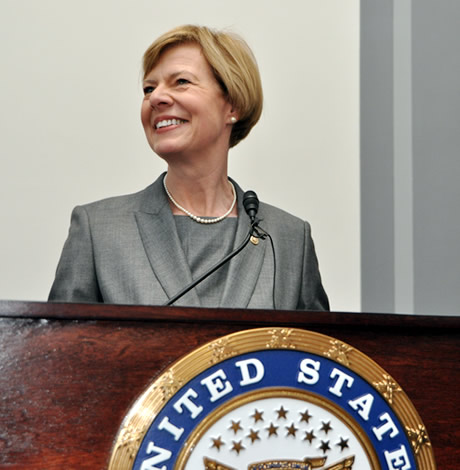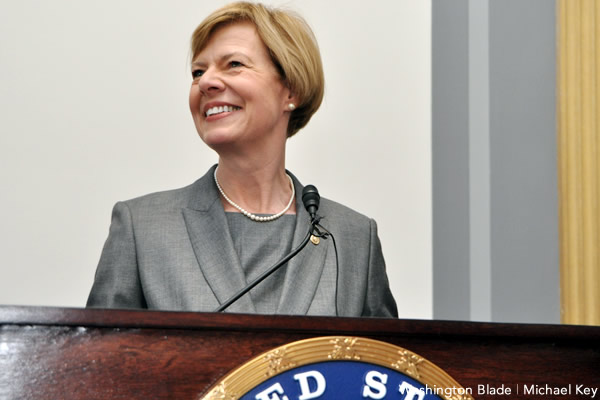News
Baldwin pledges ‘no’ vote on bill barring Syrian refugees
Lesbian senator calls on NGOs to step up efforts for LGBT asylum-seekers


Sen. Tammy Baldwin said she would vote “no” on legislation barring Syrian refugees. (Washington Blade file photo by Michael Key)
Following anger in the LGBT community over gay and bisexual members of the U.S. House voting for legislation seen to bar Syrian refugees from entering the United States, Sen. Tammy Baldwin (D-Wis.) said Thursday she’d vote “no” if the same bill came to the floor of the U.S. Senate.
Baldwin made the remarks during a panel of the Atlantic LGBT Summit titled “Unfinished Business” in D.C. in response to a question from the Washington Blade, saying, “I would vote ‘no’ on that legislation if it were to come before the Senate.”
The only out lesbian in the Senate emphasized the rigorous nature of the system for screening refugees before they enter the United States, saying it contrasts with the visa program President Obama has placed under review following the San Bernardino shootings.
“Our refugee process is the most rigorous of all the ways to get into the United States, often taking between 18 and 24 months,” Baldwin said. “Visa waiver? Another thing altogether. And so, we need to be rational and certainly not just playing the politics of the moment, or tacking it to people’s fearfulness, but we need to be informed and educated, and I can use my position in the Senate, hopefully, to educate my constituency and my colleagues to some degree.”
Baldwin also expressed confidence the need for her to vote against the legislation would never arise, saying, “I think you’ve seen what we thought was going to be an immediate reaction in the Senate to take up the House-passed bill to a real pivot in the conservation, and sort of let’s look where we need to be looking.”
The U.S. House passed the legislation, the American Security Against Foreign Enemies Act, by a vote of 289-137 last month. The bill would expand background checks on Iraqi and Syrian refugees hoping to enter the United States, but critics say the legislation would have the effect of barring them entirely.
Among those joining Republicans in voting in favor of the legislation were 47 Democrats, including Rep. Jared Polis (D-Colo.), who’s gay; Rep. Sean Patrick Maloney (D-N.Y.), who’s gay; and Rep. Kyrsten Sinema (D-Ariz.), who’s bisexual. The support of these three lawmakers for the legislation has invoked the ire of some LGBT advocates who argue members of the LGBT community should support another community facing persecution.
Anti-LGBT persecution is among the hardships refugees are fleeing from the areas controlled by ISIS. Reports have shown men perceived as gay being thrown to their death from rooftops.
Asked by the Blade after the panel whether she sees any imperative as an LGBT advocate to support Syrian refugees because they face anti-LGBT discrimination, Baldwin said “we saw this also during the Iraq war” and talked about the importance of efforts from non-governmental organizations.
“It is important to me that the international institutions that help refugees, especially with their passage through various places before there’s an ultimate determination of where they get final refugee status, that there’s a sensitivity in those NGOs as well as government-sponsored organizations to the struggles and the victimization of LGBT refugees,” Baldwin said. “Often times, that is not a priority, that’s not even on folks’ radar screens, and yet they’re a particularly vulnerable population.”
Baldwin added, “Often times, in the interim as a final refugee determination is being made, they’re in countries or locations with hostile laws, hostile customs, etc. And so, I think our international efforts have to focus on greater security, safety and protection, and frankly, knowledge and competence about LGBT issues.”
Amid calls for the Obama administration to set aside 500 slots for LGBT people among the additional 10,000 refugees anticipated from Syria, White House Press Secretary Josh Earnest said this week the administration doesn’t institute quotas for certain types of refugees, but those facing persecution like the anti-LGBT violence perpetuated by ISIS would be considered a priority for asylum cases.
State Department
State Department releases annual human rights report
Antony Blinken reiterates criticism of Uganda’s Anti-Homosexuality Act

Secretary of State Antony Blinken on Monday once again reiterated his criticism of Uganda’s Anti-Homosexuality Act upon release of the State Department’s annual human rights report.
“This year’s report also captures human rights abuses against members of vulnerable communities,” he told reporters. “In Afghanistan, the Taliban have limited work opportunities for women, shuttered institutions found educating girls, and increasing floggings for women and men accused of, quote, ‘immoral behavior,’ end quote. Uganda passed a draconian and discriminatory Anti-Homosexuality Act, threatening LGBTQI+ individuals with life imprisonment, even death, simply for being with the person they loved.”
Ugandan President Yoweri Museveni last May signed the law, which contains a death penalty provision for “aggravated homosexuality.”
The U.S. subsequently imposed visa restrictions on Ugandan officials and removed the country from a program that allows sub-Saharan African countries to trade duty-free with the U.S. The World Bank Group also announced the suspension of new loans to Uganda.
Uganda’s Constitutional Court earlier this month refused to “nullify the Anti-Homosexuality Act in its totality.” More than a dozen Ugandan LGBTQ activists have appealed the ruling.
Clare Byarugaba of Chapter Four Uganda, a Ugandan LGBTQ rights group, on Monday met with National Security Council Chief-of-Staff Curtis Ried. Jay Gilliam, the senior LGBTQI+ coordinator for the U.S. Agency for International Development, in February traveled to Uganda and met with LGBTQ activists who discussed the Anti-Homosexuality Act’s impact.
“LGBTQI+ activists reported police arrested numerous individuals on the basis of their sexual orientation or gender identity and subjected many to forced anal exams, a medically discredited practice with no evidentiary value that was considered a form of cruel, inhuman, and degrading treatment and could amount to torture,” reads the human rights report.
The report, among other things, also notes Ugandan human rights activists “reported numerous instances of state and non-state actor violence and harassment against LGBTQI+ persons and noted authorities did not adequately investigate the cases.”
Report highlights anti-LGBTQ crackdowns in Ghana, Hungary, Russia
Ghanaian lawmakers on Feb. 28 approved the Promotion of Proper Human Sexual Rights and Ghanaian Family Values Bill. The country’s president, Nana Akufo-Addo, has said he will not sign the measure until the Ghanaian Supreme Court rules on whether it is constitutional or not.
The human rights report notes “laws criminalizing consensual same-sex sexual conduct between adults” and “crimes involving violence or threats of violence targeting lesbian, gay, bisexual, transgender, queer or intersex persons” are among the “significant human rights issues” in Ghana.
The report documents Hungarian Prime Minister Viktor Orbán and members of his right-wing Fidesz party’s continued rhetoric against “gender ideology.” It also notes Russia’s ongoing crackdown against LGBTQ people that includes reports of “state actors committed violence against LGBTQI+ individuals based on their sexual orientation or gender identity, particularly in Chechnya.”
The report specifically notes Russian President Vladimir Putin on July 24 signed a law that bans “legal gender recognition, medical interventions aimed at changing the sex of a person, and gender-affirming care.” It also points out Papua New Guinea is among the countries in which consensual same-sex sexual relations remain criminalized.

The Cook Islands and Mauritius in decriminalized homosexuality in 2023.
The report notes the Namibia Supreme Court last May ruled the country must recognize same-sex marriages legally performed outside the country. The report also highlights the Indian Supreme Court’s ruling against marriage equality that it issued last October. (It later announced it would consider an appeal of the decision.)
Congress requires the State Department to release a human rights report each year.
The Biden-Harris administration in 2021 released a memorandum that committed the U.S. to promoting LGBTQ+ and intersex rights abroad.
The full report can be read here.

Dominica’s High Court of Justice on Monday struck down provisions of a law that criminalized consensual same-sex sexual relations.
A gay man who remains anonymous in 2019 challenged sections of the country’s Sexual Offenses Act that criminalized anal sex and “gross indecency” with up to 10 years and 12 years in prison respectively. The plaintiff argued the provisions violated his constitutional rights.
The Dominica Equality and Sexual Expression Association and the Eastern Caribbean Alliance for Diversity and Equality, a group that advocates for LGBTQ and intersex rights in the region, in a press release noted the court in its ruling affirmed “the criminalization of consensual same-sex activity between adults is unconstitutional.” The groups added Justice Kimberly Cenac-Phulgence “declared that the laws commonly known as buggery and gross indecency laws, contravenes the constitution of the Commonwealth of Dominica, namely the right to liberty, freedom of expression, and protection of personal privacy.”
“It is long past time that the dignity and dreams of all Dominicans were recognized,” said DESEA Executive Director Sylvester Jno Baptiste in the press release. “We are all God’s children, and he loves us all equally. Laws that treat some Dominicans as less than others, have no place in a just society.”
Dominica is a former British colony that is located between Guadeloupe and Martinique in the Lesser Antilles.
Antigua and Barbuda, St. Kitts and Nevis, Barbados, and Trinidad and Tobago in recent years have decriminalized consensual same-sex sexual relations.
The Inter-American Commission on Human Rights in 2021 issued a decision that said Jamaica must repeal its colonial-era sodomy law. The country’s Supreme Court last year ruled against a gay man who challenged it.
A judge on St. Vincent and the Grenadines’s top court in February dismissed two cases that challenged the country’s sodomy laws.
“Decriminalization helps create an environment where LGBTQ individuals can live openly without fear of persecution, enabling them to access health care, education, and employment without facing discrimination,” said Outright Executive Director Maria Sjödin on Monday in response to the Dominica ruling. “The repeal of these discriminatory laws is a testament to the tireless efforts of activists, advocates, and allies who have long fought for justice and equality. It is a victory for human rights and a significant milestone in the ongoing struggle for LGBTQ rights in the Caribbean.”
Politics
Smithsonian staff concerned about future of LGBTQ programming amid GOP scrutiny
Secretary Lonnie Bunch says ‘LGBTQ+ content is welcome’

Staff at the Smithsonian Institution are concerned about the future of LGBTQ programming as several events featuring a drag performer were cancelled or postponed following scrutiny by House Republicans, according to emails reviewed by the Washington Post.
In December, Secretary Lonnie G. Bunch III appeared before a hearing led by GOP members of the Committee on House Administration, who flagged concerns about the Smithsonian’s involvement in “the Left’s indoctrination of our children.”
Under questioning from U.S. Rep. Stephanie Bice (R-Okla.), Bunch said he was “surprised” to learn the Smithsonian had hosted six drag events over the past three years, telling the lawmakers “It’s not appropriate to expose children” to these performances.
Collaborations with drag artist Pattie Gonia in December, January, and March were subsequently postponed or cancelled, the Post reported on Saturday, adding that a Smithsonian spokesperson blamed “budgetary constraints and other resource issues” and the museums are still developing programming for Pride month in June.
“I, along with all senior leaders, take seriously the concerns expressed by staff and will continue to do so,” Bunch said in a statement to the paper. “As we have reiterated, LGBTQ+ content is welcome at the Smithsonian.”
The secretary sent an email on Friday expressing plans to meet with leaders of the Smithsonian Pride Alliance, one of the two groups that detailed their concerns to him following December’s hearing.
Bunch told the Pride Alliance in January that with his response to Bice’s question, his intention was to “immediately stress that the Smithsonian does not expose children to inappropriate content.”
“A hearing setting does not give you ample time to expand,” he said, adding that with more time he would have spoken “more broadly about the merits and goals of our programming and content development and how we equip parents to make choices about what content their children experience.”
-

 District of Columbia5 days ago
District of Columbia5 days agoNew D.C. LGBTQ+ bar Crush set to open April 19
-

 South America3 days ago
South America3 days agoDaniel Zamudio murderer’s parole request denied
-

 Maryland4 days ago
Maryland4 days agoMontgomery County police chief discusses arrest of trans student charged with planned school shooting
-

 Politics5 days ago
Politics5 days agoCourt records raise concerns about right-wing TikTok investor’s influence












